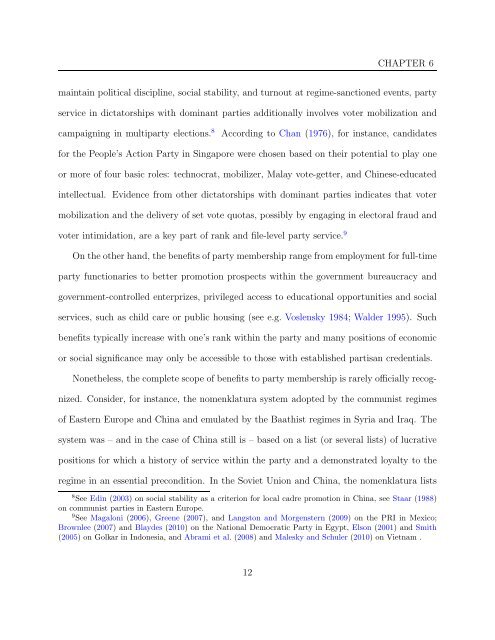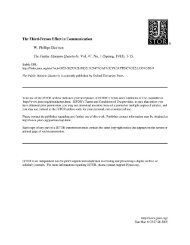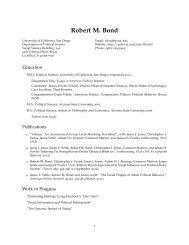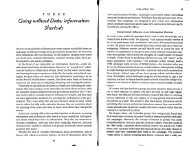Chapter 6 Why Authoritarian Parties? The Regime Party as an ...
Chapter 6 Why Authoritarian Parties? The Regime Party as an ...
Chapter 6 Why Authoritarian Parties? The Regime Party as an ...
Create successful ePaper yourself
Turn your PDF publications into a flip-book with our unique Google optimized e-Paper software.
CHAPTER 6<br />
maintain political discipline, social stability, <strong>an</strong>d turnout at regime-s<strong>an</strong>ctioned events, party<br />
service in dictatorships with domin<strong>an</strong>t parties additionally involves voter mobilization <strong>an</strong>d<br />
campaigning in multiparty elections. 8 According to Ch<strong>an</strong> (1976), for inst<strong>an</strong>ce, c<strong>an</strong>didates<br />
for the People’s Action <strong>Party</strong> in Singapore were chosen b<strong>as</strong>ed on their potential to play one<br />
or more of four b<strong>as</strong>ic roles: technocrat, mobilizer, Malay vote-getter, <strong>an</strong>d Chinese-educated<br />
intellectual. Evidence from other dictatorships with domin<strong>an</strong>t parties indicates that voter<br />
mobilization <strong>an</strong>d the delivery of set vote quot<strong>as</strong>, possibly by engaging in electoral fraud <strong>an</strong>d<br />
voter intimidation, are a key part of r<strong>an</strong>k <strong>an</strong>d file-level party service. 9<br />
Ontheother h<strong>an</strong>d, thebenefitsofpartymembership r<strong>an</strong>gefromemployment forfull-time<br />
party functionaries to better promotion prospects within the government bureaucracy <strong>an</strong>d<br />
government-controlled enterprizes, privileged access to educational opportunities <strong>an</strong>d social<br />
services, such <strong>as</strong> child care or public housing (see e.g. Voslensky 1984; Walder 1995). Such<br />
benefits typically incre<strong>as</strong>e with one’s r<strong>an</strong>k within the party <strong>an</strong>d m<strong>an</strong>y positions of economic<br />
or social signific<strong>an</strong>ce may only be accessible to those with established partis<strong>an</strong> credentials.<br />
Nonetheless, the complete scope of benefits to party membership is rarely officially recog-<br />
nized. Consider, for inst<strong>an</strong>ce, the nomenklatura system adopted by the communist regimes<br />
of E<strong>as</strong>tern Europe <strong>an</strong>d China <strong>an</strong>d emulated by the Baathist regimes in Syria <strong>an</strong>d Iraq. <strong>The</strong><br />
system w<strong>as</strong> – <strong>an</strong>d in the c<strong>as</strong>e of China still is – b<strong>as</strong>ed on a list (or several lists) of lucrative<br />
positions for which a history of service within the party <strong>an</strong>d a demonstrated loyalty to the<br />
regime in <strong>an</strong> essential precondition. In the Soviet Union <strong>an</strong>d China, the nomenklatura lists<br />
8See Edin (2003) on social stability <strong>as</strong> a criterion for local cadre promotion in China, see Staar (1988)<br />
on communist parties in E<strong>as</strong>tern Europe.<br />
9See Magaloni (2006), Greene (2007), <strong>an</strong>d L<strong>an</strong>gston <strong>an</strong>d Morgenstern (2009) on the PRI in Mexico;<br />
Brownlee (2007) <strong>an</strong>d Blaydes (2010) on the National Democratic <strong>Party</strong> in Egypt, Elson (2001) <strong>an</strong>d Smith<br />
(2005) on Golkar in Indonesia, <strong>an</strong>d Abrami et al. (2008) <strong>an</strong>d Malesky <strong>an</strong>d Schuler (2010) on Vietnam .<br />
12











